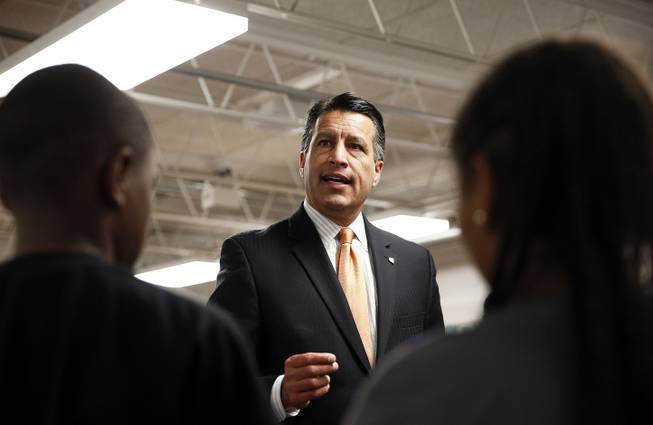
AP Photo/John Locher
Gov. Brian Sandoval, center, holds a bill signing ceremony Wednesday, June 3, 2015, in Las Vegas. The ceremony was for Senate Bill 432, which allocates millions of dollars for for low performing schools in the 20 poorest zip codes in Nevada.
Published Friday, June 5, 2015 | 11:40 a.m.
Updated Friday, June 5, 2015 | 7:45 p.m.
CARSON CITY — Gov. Brian Sandoval continued his bill-signing blitz this week with measures barring vaping product sales to minors, extending a program that offers drug counseling in lieu of jail time and clearing the way for research on industrial hemp farming.
The Republican governor signed two dozen bills on Thursday and another 27 on Friday. He has 10 days from the end of the legislative session to sign or veto measures.
Highlights among the new laws include:
• SB229, which allows for specialty license plates touting the Second Amendment. The measure authorizes a plate design featuring a frontiersman with a gun and the words "Battle Born" and "Protect the Second Amendment." Proceeds from sales of the plate would benefit the Nevada Firearms Commission, but they must be used for gun training or gun-safety education and not for political purposes. The plates can be produced when one of the 30 design slots for specialty plates becomes available.
• SB225, which bars businesses from selling vapor and alternative nicotine products to children under the age of 18. The measure brings rules about vaping products in line with those for cigarettes and chewing tobacco, and it allows for the same fine and civil penalty of $500 for people who violate the law.
• SB128, which requires Millennium Scholarship recipients to take more college credits to maintain the award. Old requirements allowed Nevada community college students to receive the scholarship if they're enrolled in at least six credit hours a semester, while the new law raises that to nine credits. The measure aims to push students toward a heavier course load, which is shown to increase their chances of completing college.
• SB305, which allows a college or the Nevada Department of Agriculture to grow industrial hemp for research purposes. The product differs from medical or recreational marijuana plants in THC content and appearance. Industrial cannabis products include things like hemp yarn.
• SB374, which aims to resolve a fight between rapidly growing rooftop solar installation companies and NV Energy. Rooftop solar companies had protested the state's 3 percent cap on net metering, which allows people with solar installations at their homes to send excess energy back to the utility company for a bill credit. NV Energy said the practice could lead to traditional customers unfairly subsidizing solar users. The compromise bill tasks the Nevada Public Utilities Commission with developing new rules and rates for net metering.
• AB234, which requires that multicultural education be included in state social studies standards. The standards must include lessons on the contributions of people from different racial and ethnic backgrounds, and must be developed in consultation with a diverse group of community members. The measure also requires teachers licensed on or after July 1 to show they've taken a course in multicultural education.
• AB198, which calls for a study of alternative sources of water that drought-stricken Nevada could potentially use. The measure charges the Legislative Committee on Public Lands to study groundwater supplies, quantify how much water per capita is used in Nevada, and explore outside-the-box water supply options such as cloud seeding and capturing rainwater. The report is due by Feb. 1, 2017, in time for the next regular legislative session.
• AB12, which will permanently extend a program offering drug and alcohol addiction counseling for some parole violators. Lawmakers voted in 2011 to establish a so-called diversion program offering drug and alcohol counseling to certain parole violators instead of sending them back to jail. The bill removes a 2015 expiration date on the program and makes it permanent. Supporters say the program cuts down on prison crowding and helps keep parole violators from repeatedly returning to prison.

Join the Discussion:
Check this out for a full explanation of our conversion to the LiveFyre commenting system and instructions on how to sign up for an account.
Full comments policy